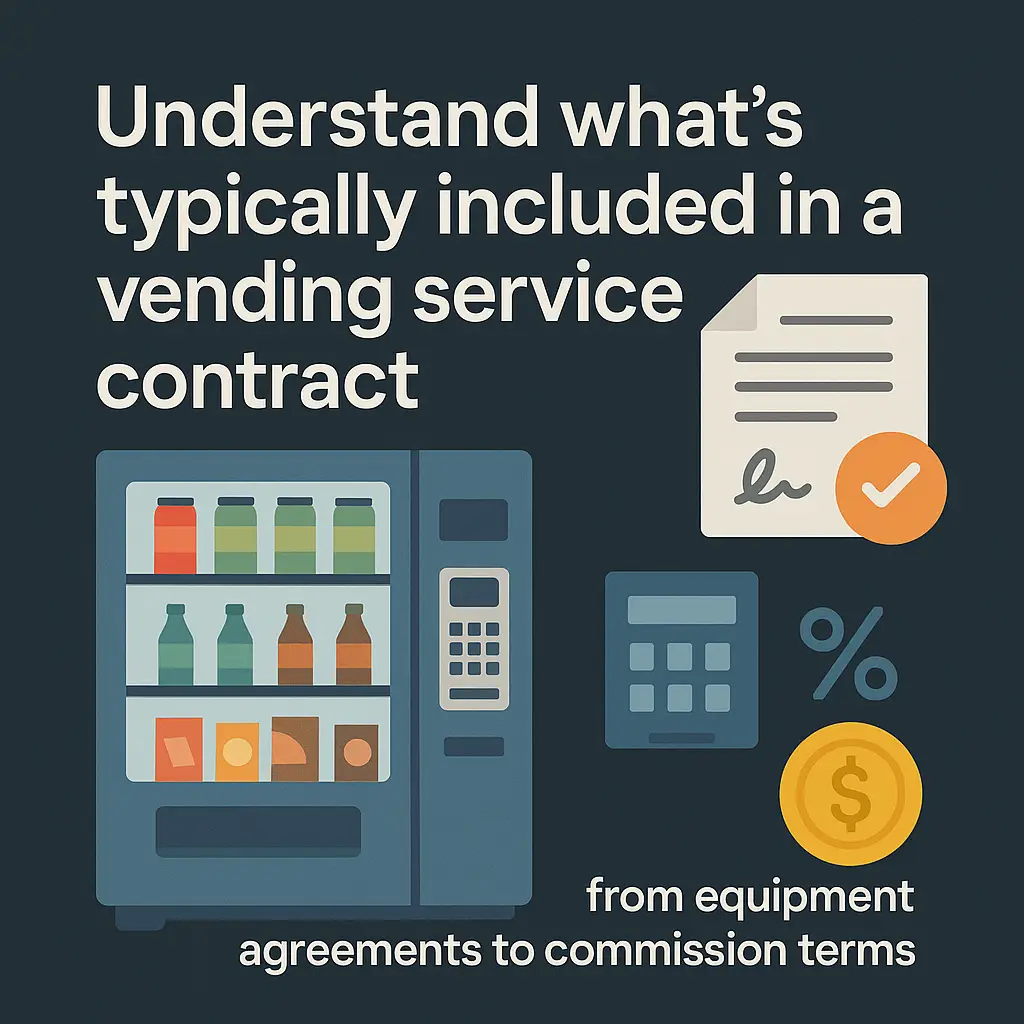How Vending Contracts Work
Understand what’s typically included in a vending service contract, from equipment agreements to commission terms.
Back to Vending Info For Businesses ResourcesUnderstand what’s typically included in a vending service contract, from equipment agreements to commission terms.
Back to Vending Info For Businesses ResourcesA vending contract typically outlines who owns the machines, what maintenance is included, and whether the location receives commission. Businesses can also expect details on response times, stocking schedules, and contract length.
![]() Most contracts include free equipment and delivery at zero cost
Most contracts include free equipment and delivery at zero cost
![]() Commission percentages vary depending on volume and location type
Commission percentages vary depending on volume and location type
![]() Vendors may handle restocking, repairs, and product expiration monitoring
Vendors may handle restocking, repairs, and product expiration monitoring

Before bringing vending machines into your business, it’s important to understand how vending contracts work. These agreements outline the responsibilities of both the vendor and the location, including equipment terms, service obligations, and payment structures. Typically, machines are provided, delivered, and installed by the vendor at no cost to you—as long as your location qualifies based on foot traffic or staffing.
Ownership of vending equipment is almost always retained by the vendor. That means if the machine breaks, it’s their job to fix or replace it. Most agreements also include service details like restocking frequency and response time for maintenance requests. Businesses should ask how often the machine will be checked for expired or low stock items, as this varies by provider.
Commissions are another key part of vending contracts. In some cases, the location earns a percentage of sales. The amount depends on factors like product pricing, total machine revenue, and operational costs. In free-vend models—where products are covered by the business for employee perks—commissions don’t apply, but you may still receive favorable servicing terms.
Many vending contracts are month-to-month or include opt-out clauses, but others may lock you in for 1–3 years. Be sure to review the contract length, any cancellation fees, and what happens if a vendor doesn’t meet their promised service levels. Some businesses choose a healthier vending model or smart vending option to reduce employee complaints and improve reliability.
Service quality matters just as much as contract terms. Past frustrations with broken machines and poor maintenance are common reasons businesses look to switch providers. Checking vendor references, technology capabilities, and product freshness policies before signing is always a smart move.
Want to hear how guests perceive vending reliability? See our breakdown of real guest feedback in hotel vending to understand what matters most to users.
If you're exploring vending options for your business, Vending Exchange can help simplify the process. Delivery, Installation and Equipment is provided at no cost to you - vendors provide the machines, keep them stocked, and handle all servicing. Whether you need a provider or full-service management, just fill out the form on this page to get started.
Most vending contracts outline machine ownership, maintenance terms, product restocking schedules, and any commission arrangements. It also includes the contract length and service standards.
Yes, qualifying locations typically receive free equipment, installation, and servicing. Vendors earn from the product sales or arrangements like employee-paid vending.
Repair and maintenance are almost always the responsibility of the vendor, as they retain ownership of the equipment under most contracts.
Many contracts include commissions, especially at high-traffic sites. The percentage varies based on sales volume and machine type.
Some contracts allow early cancellation with notice, while others may include penalties. Review contract terms carefully before signing.
This should be covered in the contract. Look for service response time clauses or automatic termination options if the vendor is noncompliant.
Contract lengths vary—some are month-to-month, others range from 1–3 years. Always check for termination clauses and renewal terms.
Yes. You can request healthy options in your vending program, and some contracts will include stocking requirements based on your preferences.
Most modern vendors include machines with cashless and mobile payment capabilities. Make sure this is confirmed in the contract.
No, profits are based on actual usage. Contracts may outline pricing strategies and restocking schedules but can’t guarantee earnings.